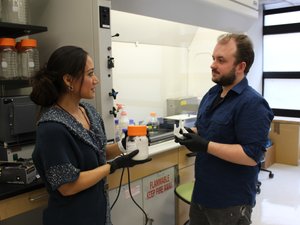
Sean Chou helped lead his last tech company to a $1 billion exit. Today, he's nearly three years in to his next tech venture Catalytic, a fast-growing Chicago startup that's landing Fortune 500 customers and backing from big-name investors.
In 2016, Catalytic raised $11.1 million from multiple notable venture capital funds, including NEA, Pritzker Group, Hyde Park Angels, Chicago Ventures and Hyde Park Venture Partners. Now, as the company continues to tweak its platform, the artificial intelligence startup is quietly gearing up to raise more capital.
Catalytic, an artificial intelligence startup which helps businesses automate business processes, is planning to launch its Series B funding round in the second quarter of 2018. Chou, the startup's CEO, declined to say how much the company plans to raise, but he said that the funding will enable the company to “double or triple the staff over the next six to 12 months."
“We’re focused very much on growing the engineering team in appropriate response to growing our customer base and building up revenue,” he said. “The thing about selling to large companies is that you need good people to help you grow a business.”
Catalytic’s software aims to simplify common or mundane business tasks, such as gathering data from multiple sources in order to generate reports for guiding management decisions; generating month-end financial closing documents; analyzing customer emails to determine whether customers are unhappy or need help; or creating and managing contracts.
Since its founding in July 2015, the company has grown to 45 staffers, brought 18 companies onto its platform, and created about 180 “actions” which can automate different business tasks such as finding contact information, looking up information in Microsoft Excel files or uploading documents into Sharepoint. It also integrates common business software such as Salesforce, Slack, Dropbox, Stripe, and DocuSign.
The company began charging for access to the platform in January of this year. Chou declined to provide revenue figures for the company.
Prior to starting Catalytic, Chou was employee No. 2 and the founding CTO at Fieldglass, a cloud-based vendor management platform which was acquired by SAP for more than $1 billion in 2014.
“My previous experience at Fieldglass has shaped a lot of how we’ve built Catalytic. A lot of the lessons learned—how to serve large companies, how to build effective teams, how to deliver a complex technology solution that can scale, etc.—apply on a daily basis,” Chou said.
“The way we think about our jobs is not at all about replacing people, but freeing people so that they can go do more things.”
While Fieldglass was a great success, it was a tough niche market to enter. Catalytic may have a greater market opportunity because it can be used in different ways, Chou said, though the gap between “execution and opportunity are still quite far apart.”
“[At] Fieldglass, we proved that we could execute within a reasonably large market. But that journey concluded, albeit at a pretty happy place,” Chou wrote. “With Catalytic, we are showing signs that we are able to execute with a much larger market. But our journey is still ahead of us.”
Chou declined to name the companies currently using the platform, but he said that 12 of its current clients are Fortune 500 companies. Most of the company’s clients have between 50,000 and 100,000 employees, he said.
Catalytic’s larger, Fortune 500 clients have turned to the platform to handle back-office functions like collecting data to guide decision-making and simplifying “overgrown spreadsheets and other business productivity tools,” Chou said.
For now, Catalytic is primarily focused on large corporations, though Chou said some of its clients are smaller companies. The company has a waiting list of companies interested in the platform, but Catalytic wants to grow its staff, improve the platform and its support infrastructure so it can properly service mid-size firms, Chou said.
Fooda, a Chicago-based food technology platform with 250 employees which is listed as a client on Catalytic’s website, signed on to be an early beta customer of Catalytic, Neil Block, sales operations manager at Fooda, said in an email.
“Beyond Catalytic’s unique product, the standout quality of their business has been their attention to our business,” Block said. “We use their systems to manage some complex logistics of our business, and Catalytic values excellence in execution as much as we do.”
Though broader discussions surrounding artificial intelligence focus on the technology’s potential to replace workers, Chou insisted that Catalytic is a “people-friendly” automation platform. At a time when employees are beginning to consider the impact of their work beyond their paychecks, the platform, he says, is meant to free up employees from having to do mundane tasks so they can focus on more substantive duties.
“A lot of efforts at automation fail because they try to ignore or push out people,” Chou said. “The way we think about our jobs is not at all about replacing people, but freeing people so that they can go do more things.”








